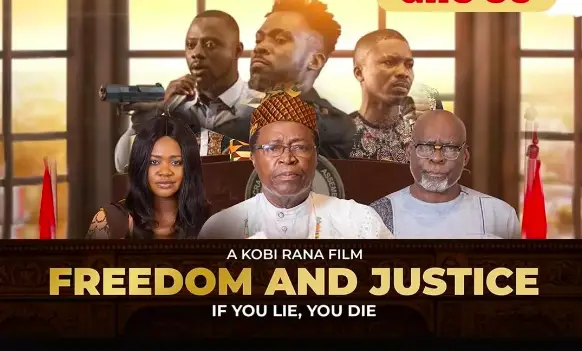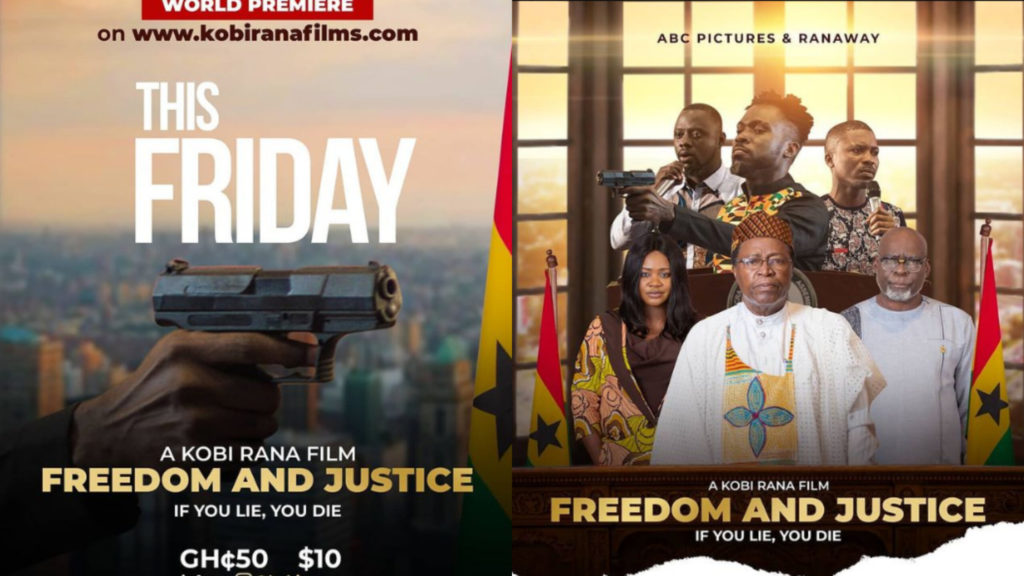In 2020, Ghana witnessed a rare event that sent shockwaves through the film industry and sparked intense public debates. The movie by Kobi Rana “Freedom And Justice,” a highly anticipated film exploring politically sensitive themes, faced an unexpected ban from being shown in the country. The decision generated a lot of opinions and raised questions about freedom of expression, censorship, and the role of art in society. There are many reasons behind the ban and the implications it carries for Ghana’s cultural landscape and the movie industry in the country.

Plot and Controversial Themes of Freedom And Justice
“Freedom And Justice” is a gripping drama set in a fictional African nation overcome with political upheaval, corruption, and human rights issues. The film’s storyline revolves around a young journalist’s pursuit of truth and justice, uncovering a web of deceit and power struggles within the nation’s highest leaders. As the plot unfolds, the movie delves into themes of government accountability, media freedom, and the complexities of the justice system.
The Decision to Ban
The Ghanaian authorities cited several reasons for the ban of “Freedom And Justice.” First and foremost, they argued that the film depicted sensitive political scenarios that closely mirrored real-life events in Ghana and neighbouring countries. Concerns were raised that the movie’s portrayal of corruption within the government and the judiciary could potentially incite civil unrest or tarnish the country’s image on the international stage.
Moreover, some officials claimed that the film’s realistic depiction of the struggles faced by journalists could put real-life reporters at risk. They argued that certain scenes might encourage copycat behaviour and compromise national security, especially during a time of heightened political tension.

Freedom of Expression vs. Censorship
The ban of “Freedom And Justice” ignited fierce debates regarding freedom of expression and artistic liberty in Ghana. Advocates for freedom of expression argued that censorship of art restricts creativity and hampers the ability of filmmakers to address pertinent societal issues. They viewed the ban as an attempt to suppress dissenting voices and control the narrative, thus hindering the country’s progress toward a more transparent and accountable government.
On the other hand, those who supported the ban emphasised the need to prioritise national stability and security over artistic expression. They contended that filmmakers should exercise caution when tackling politically sensitive topics and avoid potentially incendiary narratives that could disrupt social harmony.
Impact on the Film Industry
The ban of “Freedom And Justice” sent ripples through Ghana’s film industry. Filmmakers and artists expressed concerns that such censorship might deter them from exploring relevant and challenging subjects in their work. They feared that the spectre of potential bans could lead to self-censorship, stifling creativity and limiting the diversity of stories presented to audiences.
Furthermore, the ban sparked discussions about the necessity of a clear and transparent regulatory framework for the film industry. Many called for constructive engagement between filmmakers, authorities, and other stakeholders to strike a balance between artistic freedom and societal responsibility.

The ban of “Freedom And Justice” by Kobi Rana in Ghana stirred a national conversation about freedom of expression. While some argued that the film’s content warranted careful consideration due to its violent nature, others emphasised the importance creating a space for unrestricted creative art. In December 2022, the movie was finally allowed to be premiered in Kumasi, a city in Ghana after constant corresponding with the Ministry of Tourism. Watch the trailer to the movie here.